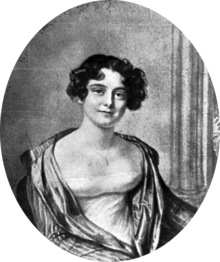Jane Franklin
| Jane, Lady Franklin | |
|---|---|

Portrait by Amelie Romilly
|
|
| Born |
Jane Griffin 4 December 1791 London, England |
| Died | 18 July 1875 (aged 83) London, England |
| Spouse(s) | Sir John Franklin (5 November 1828 – 11 June 1847) (his death) |
Jane Franklin (née Griffin; 4 December 1791 – 18 July 1875), known as Lady Franklin after her husband's knighthood, was the second wife of the English explorer Sir John Franklin. During her husband's period as Lieutenant-Governor of Van Diemen's Land, she became known for her philanthropic work and her travels throughout south-eastern Australia. After John Franklin's disappearance, she sponsored or otherwise supported several expeditions to determine his fate.
Jane was the second daughter of John Griffin, a liveryman and later governor of the Goldsmith's Company, and his wife Jane Guillemard. There was Huguenot ancestry on both sides of her family. She was born in London, where she was raised with her sisters Frances and Mary at the family house, 21 Bedford Place, just off Bedford Square. She was well educated, and her father being well-to-do had her education completed by much travel on the continent. Her portrait was chalked when she was 24 by Amelie Romilly at Geneva.
As a young woman, Jane was strongly attracted to a London physician and scientist, Dr. Peter Mark Roget, best known for publishing Roget's Thesaurus. She once said he was the only man who made her swoon, but nothing ever came of the relationship.
Jane had been a friend of John Franklin's first wife, the poet Eleanor Anne Porden, who died early in 1825. In 1828, he and Jane Griffin became engaged. They married on 5 November 1828, and in 1829 he was knighted. During the next three years she spent lengthy periods apart from her husband while he served in the Mediterranean. In 1836 he was appointed lieutenant-governor of Van Diemen's Land (Tasmania), disembarking from the immigrant ship Fairlie on 6 January 1837.
...
Wikipedia
